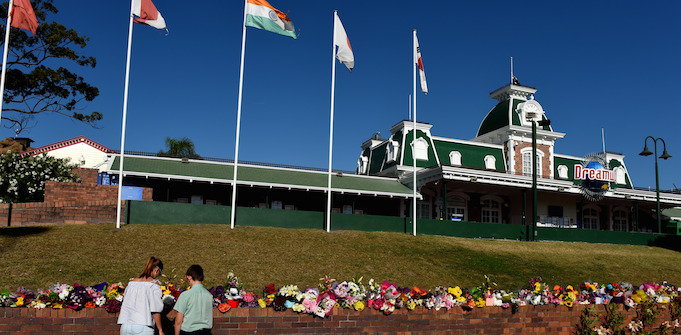
Source: AAP/Dan Peled
By David Beirman, University of Technology Sydney
Ardent Leisure, the company that owns Dreamworld, has felt the blowtorch of public scrutiny since the Thunder River Rapid ride tragedy, which resulted in the deaths of four visitors. In one of the more embarrassing revelations at the press conference the company held, Ardent chief executive Deborah Thomas said she had not called the families of victims because Ardent “didn’t know how to contact them”.
In any crisis event that results in loss of life, making contact with victims and their families should be a top priority. This is one of the “ten commandments” in dealing with a crisis event, set out by one of Australia’s most respected experts Sandy Hollway.
After being chief organiser at the 2000 Sydney Olympics, Hollway has been appointed to a number of positions including overseeing Canberra’s recovery from bushfires in 2003 to being in charge of the recovery of North Queensland in 2006 following Cyclone Larry, which devastated much of far North Queensland.
Hollway summarised his approach to recovering after a crisis in a 2007 speech to the APEC (Asia Pacific Economic Cooperation) Tourism Forum. It included benchmarks relevant to all tourism businesses and destinations seeking to restore their reputation following a crisis event. He said there should be:
- Collaboration between the private sector and the public sector;
- Dedicated machinery and resources devoted to recovery, within agreed time limits;
- In the case of destination recovery, all tiers of government should be involved;
- Rapid response, especially in dealing with traditional and social media;
- Engagement and support for the affected community, especially victims;
- Public communications which are centralised, honest and informative;
- Proper process with planned outcomes;
- Importance should be placed on people more than budgets;
- Strategic and contingency planning to get ahead of the curve; and
- A focus on building back better.
Ardent Leisure owns many tourist attractions in Australia and other countries. It is not naive about risk management. In 2012 the company won the Risk Management Advancer award for its commitment to risk management practice.
Legal requirements under occupational health and safety laws require public tourist attractions to observe strictly enforced protocols for the safety of all rides used by the public.
Tragically, even in the best run attractions fatal accidents can and do occur. This places operators in crisis mode.
Based on Hollway’s “ten commandments,” Ardent Leisure clearly has much to learn to rapidly restore its reputation as a family friendly and safe tourist attraction.
The Thunder River Rapid ride tragedy has exposed tensions between Ardent’s management and its workers, which is potentially toxic when the company needs to demonstrate a united front in response to the tragedy. Although the the Gold Coast local government is supportive of Dreamworld, there are some suggestions that communications between the Council and local government could be improved.
Ardent Leisure also appears to be in desperate need of a crash course on crisis communications. You can sympathise with the intense pressures placed on Adent’s chief executive in dealing with an emotive and unexpected disaster, however, a crisis event of this sort requires leadership and control.
There is no legitimate excuse for failing to contact the immediate families of the victims. Whether the crisis results from a plane crash, hotel fire or a natural disaster, all tourism related businesses should know victims come first.
The impact of the Dreamworld tragedy extends beyond its impact on a single attraction. As Daniel Geshwind, head of the Queensland Tourism Industry Council pointed out, the Dreamworld tragedy affects the reputation of family friendly safety for the entire Gold Coast tourism industry and all attractions. This has been recognised by the Queensland government, which is determined to ensure Dreamworld remains closed until there has been a full investigation of the incident.
Crisis management is one of the world’s fastest growing fields in management and specifically, tourism management research and teaching. Queensland universities and the Queensland Tourism Industry Council have played a leading role in advancing crisis management skills in the tourism industry in the Australian state which is most economically reliant on tourism. As the UN World Tourism Organisation has recognised for some years, crisis management is an essential skill for all tourism businesses.![]()
David Beirman is a senior lecturer in tourism at the University of Technology Sydney.
This article was originally published on The Conversation. Read the original article.


COMMENTS
SmartCompany is committed to hosting lively discussions. Help us keep the conversation useful, interesting and welcoming. We aim to publish comments quickly in the interest of promoting robust conversation, but we’re a small team and we deploy filters to protect against legal risk. Occasionally your comment may be held up while it is being reviewed, but we’re working as fast as we can to keep the conversation rolling.
The SmartCompany comment section is members-only content. Please subscribe to leave a comment.
The SmartCompany comment section is members-only content. Please login to leave a comment.